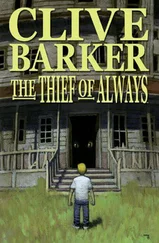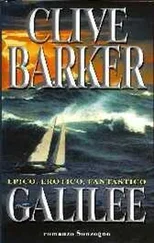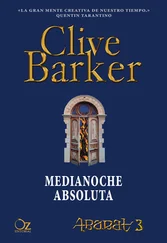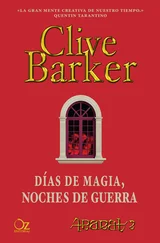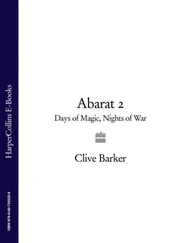Clive Barker - Sacrament
Здесь есть возможность читать онлайн «Clive Barker - Sacrament» — ознакомительный отрывок электронной книги совершенно бесплатно, а после прочтения отрывка купить полную версию. В некоторых случаях можно слушать аудио, скачать через торрент в формате fb2 и присутствует краткое содержание. Жанр: Фантастика и фэнтези, на английском языке. Описание произведения, (предисловие) а так же отзывы посетителей доступны на портале библиотеки ЛибКат.
- Название:Sacrament
- Автор:
- Жанр:
- Год:неизвестен
- ISBN:нет данных
- Рейтинг книги:5 / 5. Голосов: 1
-
Избранное:Добавить в избранное
- Отзывы:
-
Ваша оценка:
- 100
- 1
- 2
- 3
- 4
- 5
Sacrament: краткое содержание, описание и аннотация
Предлагаем к чтению аннотацию, описание, краткое содержание или предисловие (зависит от того, что написал сам автор книги «Sacrament»). Если вы не нашли необходимую информацию о книге — напишите в комментариях, мы постараемся отыскать её.
Sacrament — читать онлайн ознакомительный отрывок
Ниже представлен текст книги, разбитый по страницам. Система сохранения места последней прочитанной страницы, позволяет с удобством читать онлайн бесплатно книгу «Sacrament», без необходимости каждый раз заново искать на чём Вы остановились. Поставьте закладку, и сможете в любой момент перейти на страницу, на которой закончили чтение.
Интервал:
Закладка:
He'd left off reading with Dwyer moving from occult waters, where she'd plainly been out of her depth, back into the relative comfort of simple biography. Simeon's ever-reliable friend Galloway reappeared at this juncture, having been moved by 'the commands of friendship' (what had gone on between these two? Will wondered) to separate Simeon from his patron, Rukenau, 'whose baleful influence could be seen in every part of Thomas's appearance and demeanour'. Galloway, it seems, had conspired to save Simeon's soul from Rukenau's clutches; an attempt which, by Dwyer's description, amounted to a physical abduction: 'Aided by two accomplices, Piers Varty and Edmund Maupertius, the latter a disenchanted and much embittered acolyte of Rukenau, Galloway plotted Simeon's "liberation" as he was later to describe it, with the kind of precision that befitted his military upbringing. It went without incident, apparently. Simeon was discovered in one of the upper rooms of Rukenau's mansion in Ludlow, where, according to Galloway: "We found him in a piteous state, his once radiant form much wasted. He would not be persuaded to leave, however, saying that the work he and Rukenau were doing together was too important to be left unfinished. I asked him what work this was, and he told us that the age of the Domus Mundi was coming to pass, and that he would be its witness and its chronicler, setting down its glories in paint that Popes and Kings might know how petty their business was, and putting aside their wars and machinations, make an everlasting peace. How will this be? I asked him. And he told me to look to his painting, for it was there all made plain. "
'Only one of these paintings was to be found, however, and it appears that Galloway took it with him when he and his fellow conspirators left. How they persuaded Simeon to leave with them is not reported, but it is evident that Rukenau made some attempt to get Simeon back and that Galloway made accusations against him that drove him into hiding. Whatever happened, Rukenau now disappears from this story, and Simeon's life - which has only a few years to run - takes one last extraordinary turn.'
Will took the chapter break to go downstairs and raid the fridge, but his mind remained in the strange world from which he'd just stepped. Nothing in the here and now - not the brewing of tea nor the making of a sandwich, not the din of raucous laughter from the television next door, nor the shrill delivery of the comedian who was earning it - could distract him from the images circling in his head. It helped that he'd seen Simeon with his own eyes, living and dead. He'd seen the desperate beauty of the man, which had so fixated Galloway that he'd ventured where his rational mind had little grasp, to pluck his friend from perdition. There was something sweetly romantic about the man's devotion to Simeon, who was plainly of another order of mind entirely. Galloway did not understand him, nor ever could, but that didn't matter. The bond between them was nothing to do with intellectual compatibility. Nor, all smutty suspicions aside, was this some unspoken homosexual romance. Galloway was Simeon's friend, and he would not see harm done to one he loved: it was as simple, and as moving, as that.
Will returned to the book with his sustenance, unnoticed by Adele, and settling back beside the window (having first closed it, the night-air was chilly) he picked up the tale where he'd left off. He knew, or at least thought he knew, how this story ended, with a body in a wood, pecked and chewed. But how did it arrive there? That was the substance of the thirty pages remaining.
Dwyer had kept the text relatively free of personal judgments so far, preferring to use other voices to comment on Rukenau, for instance, and even then scrupulously quoting both supporters and detractors. But now she showed her hand, and it was no stranger to the Communion rail.
'It is in these last years,' she wrote, 'recovering from the unholy influence of Gerard Rukenau, that we see the redemptive power of Simeon's vision at work. Chastened by his encounter with madness, he returned to his labours with his ambition curbed, only to discover that with all craving for a grand thaumaturgical scheme sated, his imagination flowered. In his later works, all of which were landscapes, the hand of the artist is in service of a greater Creation. The painting entitled "The Fertile Acre", though at first glance a melancholy night-pastoral, reveals a pageant of living farms when studied closely-'
Will flipped the page to the reproduction of the painting in question. It was far less strange than the Rukenau piece, at least at first glance: a sloping field, with rows of moon-sculpted sheaves receding from sight. But even in the much-degraded reproduction, Simeon's sly skills were in evidence. He'd secreted animals everywhere: in the sheaves, and the shadow of the sheaves, in the foliage on the oak tree, in the cloak of the harvester sleeping beneath the tree. Even in the speckled sky there were forms hidden, curled up like the sleeping children of the stars.
'Here,' Dwyer wrote, 'is a mellower Simeon, painting with almost child-like pleasure the secret life of the world: drawing us in to peer at his half-hidden bestiary.'
But there was more to the picture, Will sensed, than a visual game. There was an eerie air of expectation about the image; every living thing it contained (except for the exhausted harvester) in hiding; holding its breath as if in terror of some imminent deed.
Will returned to Dwyer's text for a moment, but she had taken her critique off on a hunt for painterly antecedents, and after a few sentences he gave up and returned to the reproduction for further study. What was it about the picture that so intrigued him? It would not have been remotely to his taste if he'd simply happened upon it, knowing nothing of the painter. It was far too coy, with its prettified animals peering out from their boltholes in the paint. Coy, and unnaturally neat: the corn in military array, the leaves in spiral bouquets. Nature wasn't like that. The most placid scene, examined by an unsentimental eye, revealed a ragged world of raw forms in bitter and unending conflict. And yet, he felt a kinship with the picture; as though he and its maker were, despite all evidence to the contrary, men of similar vision.
Frustrated not to better understand his response to the work, he returned to Dwyer's text, skipping the art critique - which was mercifully short - and moving on to pick up the biographical threads. Whatever she'd claimed about the mellower Simeon, the facts of his life did not suggest a man at peace with himself.
'Between August of 1724 and March of 1725, he moved his lodgings no less than eleven times, the longest period he spent in one place being November and December, which he passed in a monastery at Dungeness. It is not clear whether he went there intending to take vows. If so, it was a passing fancy. By the middle of January he is writing to Dolores Cruikshank - who had been one of Rukenau's cronies three years before but was now, in her own words, quite cured of his influence -and states:
' "I am thinking of leaving this wretched country for Europe, where I think I may find souls more sympathetic to my vision than ever I have found in this too rational isle. I have looked everywhere for a tutor who might guide me, but I find only stale minds and staler rhetoric. It seems to me, we must invent religion every moment, as the world invents itself, for the only constant is in inconstancy. Did you ever meet a doctor of divinity who knew this simple truth; or if he knew it, dared speak it out? No. It is a heresy amongst learned men because to admit it is to unseat themselves from their certainties, and they may no longer lord themselves over us, saying: this is so, and this is not. It seems to me the purpose of religion is to say: all things are so. An invented thing and a thing we call true; a living thing and a thing we call dead; a visible thing and a thing that is yet to be: All Are So. There was one that we both knew who taught this truth, and I was too arrogant to learn it. I regret my foolishness every waking hour. I sit here in this tiny town, and look West to the islands, and pine for him like a lost dog. But I dare not go to him. He would kill me I think, for my ingratitude. Nor could I fault him for that. I was misled by well-meaning friends, but that's no excuse, is it? I should have bitten off their fingers when they came to take me. I should have choked them with their prayer-books. And now it's too late.
Читать дальшеИнтервал:
Закладка:
Похожие книги на «Sacrament»
Представляем Вашему вниманию похожие книги на «Sacrament» списком для выбора. Мы отобрали схожую по названию и смыслу литературу в надежде предоставить читателям больше вариантов отыскать новые, интересные, ещё непрочитанные произведения.
Обсуждение, отзывы о книге «Sacrament» и просто собственные мнения читателей. Оставьте ваши комментарии, напишите, что Вы думаете о произведении, его смысле или главных героях. Укажите что конкретно понравилось, а что нет, и почему Вы так считаете.

